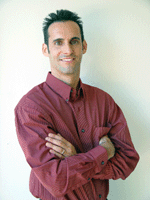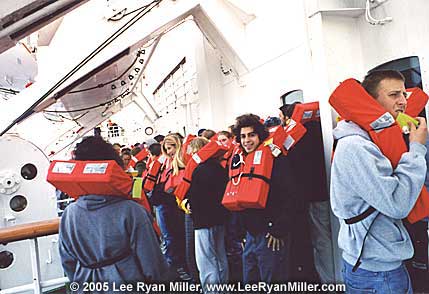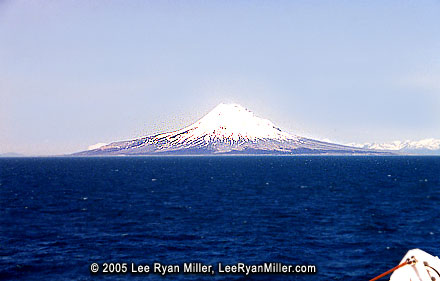|
|
Lee's Adventures on Semester at Sea ® CROSSING
THE NORTH PACIFIC
|
||
|
Introduction |
Taking
a shower was a challenge as well.
It was hard to keep the curtain closed, so that the water didn’t
spray all over the bathroom.
My towel got all wet.
On the other hand, I discovered a hidden virtue of my tiny shower:
I could brace myself easily against the rocking because the walls
were so close to my body. Somehow
I got ready for class and made it down to the Union for Core.
Steve Crosby’s students were putting on scenes from plays from
different countries on our itinerary.
I was amazed that they were able to pull it off.
I was happy to be sitting on the floor.
No fear of falling out of my chair. I was beginning to feel seasick, despite the Sea Calm pill I had taken with breakfast. I climbed back into bed. Lying down seemed to be the most comfortable position. I got up when Francis, my cabin steward, came to clean the room. He told me that he hadn’t been able to sleep the previous night, due to the rocking of the ship. I was glad that I had been able to sleep through much of it. I
went down to the Union and did some grading.
I lay down on one of the benches and graded some papers.
I did this for an hour and then returned to my cabin for a short
nap before lunch. I
decided to try the Hamilton Dining Room for lunch. Unlike the Harbor
Grill, it is located in the center of the ship, and just above the water
line, so I thought that the rocking there might be less severe.
I’m not sure whether or not my logic was correct, but the rocking
there was pretty intense.
I asked someone to hang onto my tray, which I had set on the table,
while I got a cup of tea.
Had I not made this request, my tray would have ended up on the
floor. I
got a great view of the sea from the window beside my table.
Huge gray waves crashed against the window.
Professor Terri Cook and her two-year-old son Logan sat at my
table. Logan
didn’t seem to be bothered by the rocking.
I was feeling rather queasy.
After lunch, I climbed the stairs early to my classroom.
I put a message on the board that class was cancelled, and that the
students could turn in any remaining assignments to me at 5:00 p.m. on the
second April 23.
(We will have two April 23rds this year.
We get the same day a second time when we cross the international
date line.) I
sat on the floor of my classroom and waited until the start time of my
class, just in case any students showed up to turn in or pick up
assignments.
Not very many showed up that day.
Perhaps a quarter of the class at most.
As each student entered, s/he heard a voice say, “Class is
cancelled.”
The students looked around, trying to find the sources of the
voice. It
took them a moment to notice me sitting on the floor just inside the
doorway.
Had I not felt so awful, I would have laughed. At
1255 hours, the start time for my class, I climbed with difficulty to my
feet and made my way back to my cabin.
I got into my sweats and climbed back into bed for a long nap.
The seasickness medicine was making me drowsy.
As I dozed off, I hoped that I would feel less queasy upon
awakening.
I felt better after my nap, but felt sick as soon as I tried to get
out of bed.
So I stayed in bed.
I wrote in my journal, and did some grading. I
got up briefly for dinner.
I didn’t feel well enough to stay.
I made a couple of peanut butter sandwiches and some tea.
I brought them up to my cabin.
I ate sitting on the floor, and then climbed back into bed.
I continued grading. Most
nights, videos are played on the shipboard closed circuit TV system.
This night the video was “The Perfect Storm” (a film about a
New England fishing boat that gets caught in a hurricane). Excerpt
from a journal entry dated April 24, 2003 The
seas have been a bit calmer.
Very rough, but not so rough as the day of the storm.
Barely bearable. Yesterday
was Wednesday April 23.
So was the day before yesterday.
We crossed the international date line.
What a strange feeling of déjà vu. Yesterday
also was the Ambassador’s Ball.
The $20 ticket price goes to Students of Service, an organization
that makes cash and merchandise donations to charities in the ports that
SAS visits.
On several of the trips that I led, such as the one to the favela
in Brazil and Operation Hunger in South Africa, I was responsible for
delivering donations from Students of Service. Students
and faculty dressed up in their finest outfits and had the best meal on
the ship, (except perhaps for the captain’s dinner).
There was also a slide show of pictures from our voyage and a
dance. The
slide show spurred me to reflect a bit upon my experiences aboard the
ship. This
trip has been such a whirlwind that I have not had much time for
reflection.
It occurred to me that I’ve written in my journal a lot about my
experiences in the various ports, but very little about my shipboard
experiences.
I think it is sad that the day-to-day stuff has fallen by the
wayside.
There have been some very poignant moments aboard the ship, but
they often seem mundane in comparison to the much more alien things I have
encountered in foreign lands.
The ship too often seems like a tiny outpost of the United States. It
is not, of course.
Life aboard the SS Universe Explorer in many ways is alien from
life back home.
But it is similar enough on a superficial level that the
fundamental differences often go unnoticed.
Let
me give you an example.
On the first day of class after leaving a port, I ask the students
in my class on the politics of global inequality to describe the
inequality that they observed in the previous port.
In places like Brazil, South Africa, and India, no one had much
trouble identifying examples of inequality.
For example, after leaving Cape Town, students shared their
observations about the contrast between the wealthy white enclaves that
they visited and the dire poverty of the black townships.
“White
people live pretty much like middle class and rich people in the US,” a
student remarked.
“But it was pretty disturbing to see how all the people in the
restaurants were white, and the people serving them were all black.
White people also have black servants cleaning up for them at their
homes. It
is never the other way around.” I
asked the students if they had ever observed a similar phenomenon
elsewhere.
The answers:
Brazil, the Bahamas, and even Cuba.
I asked whether anyone could come up with another example.
The class fell silent. “How
about on the ship?” I suggested. The
students’ eyes opened wide.
It had never occurred to them that we are indeed a microcosm of the
very inequality that we are studying. Most
of the students, faculty, and staff are white.
Most of us come from middle class or rich backgrounds, and most of
us are from the United States or other wealthy countries.
Most of the crewmembers on the ship are poor men with dark skins.
They leave their families behind for months at a time, and work
twelve hours or more per day, seven days per week.
The majority come from the Philippines, although there are crew
members from a dozen other poor countries.
It is these men who cook our food, wash our dishes, change our
linens, wash our clothes, and do a whole host of other things that are too
often overlooked as we focus our attention so intently upon the inequality
that exists outside our ship. Strange
how the inequality close to home so easily goes unnoticed. Excerpt
from a journal entry dated April 28, 2003 I
stayed up late grading last night.
I couldn’t fall asleep for some reason, so I just kept grading
until I got sleepy.
That was around 1:30 a.m. Last
night we had a three-hour time change in preparation for our arrival in
Alaska. So
I went to sleep at 4:30 a.m.
I was awakened by hammering at 8:30 a.m.
Crew members were repairing something on the deck above, outside my
cabin window.
I tried to fall back asleep, but the hammer continued
intermittently for more than half an hour.
I called the Purser’s Office, and was told that the crew had to
continue with their normal maintenance schedule, regardless of the time
change. Soon
thereafter, the hammering was replaced by the whine of power tools.
I gave up any hope of falling back to sleep and got up for the day.
But I did write a note to George, the Assistant Dean.
George is responsible for communications between SAS personnel and
the ship personnel.
It read something like this:
Dear
George, Please
thank the captain for the crew’s assistance in getting accustomed to the
time change.
Three hours is a big jump, and had I not been awakened by hammering
at 8:30 a.m. (5:30 a.m. by my body clock), I would have found the
transition much more difficult. Lee
Miller George
has an outrageous sense of humor, and I eagerly await his response. As
we sailed along the coast of Alaska, the scenery was breathtaking.
We passed tons of snow-capped volcanoes and glaciers.
The weather had cleared up, giving us a great view.
I spent most of my time grading, but I took periodic breaks to
stroll on deck and take a look at the scenery. Well,
it is past 11:00 p.m.—2100 hours.
I have to get up early to go through US customs and immigration
(7:00 a.m.), so I’d better get some sleep.
I didn’t get much last night.
|
|
|
|
HOME | ABOUT DR. MILLER | POPULAR WORKS | SCHOLARLY WORKS | APPEARANCES | SEMESTER AT SEA | PHOTOS | CONTACT LEE |
|
|
|
Copyright ©
1998 - 2009 Lee Ryan Miller |




